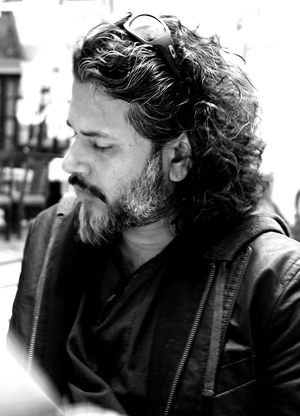A dark comedy of the afterlife

Shehan Karunatilaka: Always wanted to write a ghost story
Living up to the Legend of Pradeep Mathew would have been intimidating to say the least. Yet Shehan Karunatilaka has dealt another brilliant Chinaman- even if it was nine years in the spinning. Chats with the Dead follows that sadly stillborn manuscript Devil Dance, and promises to grow up to a strapping lad to do Shehan proud- albeit a gay one.
For at the heart of the story is Malinda Kabalana, a war photographer and gambler who is also a closeted homosexual- though this does not make him any less ‘adventurous’. If the name seems to ring certain literary bells, you are not mistaken. The name is inspired by Malin Kabalana in the film Yuganthaya, based on Martin Wickremesinghe’s landmark novel. Not because the character itself shares a lot with Shehan’s protagonist, but because the actor who played Malin was a ‘starting point’ for the novel. Richard de Zoysa, very much in the public eye when Shehan was growing up in the ‘80s, triggered quite a lot for Shehan. Part One in fact begins with an epigraph from de Zoysa’s poem, Good Friday 1975: “Father, forgive them, for I will never”.
The novel unravels from the point where Maali wakes up dead in Colombo in 1990, with no recollection of how he died, or who killed him.
A blurb reads:
“Unfortunately, many may have wanted him dead: the Sri Lankan army who he was shooting propaganda for, the human rights group who he was shooting atrocities for, the British government that he was spying for, or one of the many closeted homosexuals whose photos he had taken over the years.
“Confused, Maali wanders the in-between, chatting to embittered spirits, victims of Sri Lanka’s many wars. His only guides are Dr Ranee (here Shehan evokes Rajini Rajasingham Thiranagama), an assassinated activist who urges him to forget the past and go towards The Light, and Jagath Pathirana, a murdered Marxist who demands that he enact revenge on those who killed him.
“Maali has demons of his own. His former lovers, his estranged parents and the box of incriminating photographs that lies hidden under a bed. Like his own battle-scarred nation, he is unsure whether he should remember his past, or whether he should bury it.”
At first, you think you detect fissures in the text where the heavy pressure of that sparkling debut shows. But as the novel unfolds, you give up such paranoia and are sucked into the brilliant black comedy, which moves at a rollercoaster pace- or like the dead souls in the story who ride the fast wind- utterly hilarious but dark, packed with so much punch and life, so much graphic human insight into one of the darkest periods of our recent history. On top of it all is the robustly virile, energetic, humorous prose that seems to beat Salman Rushdie (also a copywriter and a South Asian).
Shehan had always wanted to write a ghost story. He is fortunate enough, he says, to have been born in an island ‘filled with ghosts’. Some of the ghosts he conjures up are famous. Apart from Rajini and Richard, the early drafts featured Ranjan Wijeratne, Ranasinghe Premadasa and Rohana Wijeweera (he notes the malevolent letter ‘R’). While working through the drafts, however, some of these historical spectres were replaced with fictional ones.
As for getting into the skin of a gay man, he was not too fussed about this. Just as for Chinaman he had to chat with chronic lushes, for Chats with the Dead he spoke to gay men- ‘some closeted, some not’. “But,” he says, “we all know what it is to have secrets ………..so it wasn’t too hard to see the world as Maali did.”
Maali evolved slowly over drafts. There was plenty to unpack. Apart from the war photography, the gambling and the secret gay life, he was both a nihilist and an idealist- two words Shehan thinks might describe himself as well. But most of Maali was a “thought experiment”: what would an atheist do when confronted with the afterlife?
In the novel, afterlife turns out to be a typical Sri Lankan bureaucracy. “And God is not dead,” Shehan informs us, “she is just not in her office this afternoon. But might be back after the long weekend.”
As for getting right that twilight zone of the late 1980s, more red with blood than with the dying light of the century, much was through books and talking with people who remember. Shehan himself, at the time a child, spent most curfews “watching VHS cassettes of horror movies, Vietnam war films and music videos”, or “playing carrom, monopoly and 304, riding BMX bikes, and practising my left arm spin.”
While writing (during the post-war period which did radiate hope) Shehan thought he was dealing with history- “about a long ago time of curfews, bombs, pogroms and race hate”. Yet the recent events, stumbling in with dread familiarity after the Gratiaen shortlist was announced, have “reinforced a key idea in Chats With The Dead: that this beautiful island is cursed.”
Asked what his own ‘newborn’ has taught him, Shehan says it is that “man-made horrors are much more terrifying than anything the supernatural can conjure up.”
He has done straight; he has done queer- but in both cases there are similarities- not least that both are men. Besides, at the heart of his writing is something intrinsically, attractively macho. Would he ever have a woman as a protagonist?
Shehan says he has a story in cold storage that may develop into a novel, with a woman narrator. “I will attempt it one day when I’m brave enough.” A spirited young thing leading you into more obscure crevices and nooks and crannies of fascinating Sri Lankan life? Truly something to anticipate.
The Gratiaen Prize will be announced on June 9.


